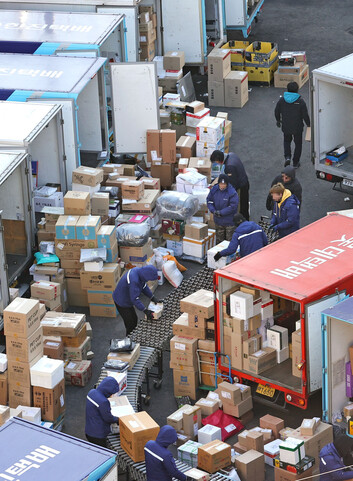Courier companies oppose classification business stipulation
“Determined in conjunction with a courier rate increase”
Union “Labor improvement and fees are separate
The company is 100% responsible for manpower input.”
On the 27th, a general strike advances voting for pros and cons

Workers are moving goods at a courier distribution center in Seoul on the morning of the 19th, while the courier union demanded measures to prevent overwork from the courier company and announced a general strike when negotiations broke down. yunhap news
Amid an explosive increase in parcel delivery ahead of the Lunar New Year holidays, the tripartite social consensus organization, which discusses measures to prevent overwork of parcel workers, has repeatedly held meetings and has yet to reach a final conclusion. The issue is the issue of responsibility for classification work, which is considered the cause of overwork of courier workers. The national courier union, which announced that it would go on a general strike on the 27th if an agreement could not be reached, entered a vote for and against the members from the 20th. In summary, the social consensus organization, which has been discussing measures to prevent overwork of courier workers since last month, failed to reach an agreement on this day following the 5th meeting held at the National Assembly the previous day. In this organization, the courier workers’ overwork countermeasure committee, the Korean Integrated Logistics Association, the government (Ministry of Land, Infrastructure and Transport, Ministry of Employment and Labor, etc.), the Democratic Party, and consumer organizations, are participating in this organization. Earlier, the union announced that if social consensus was not reached by the 19th, it would go on a general strike on the 27th. To this end, the two days on the 20th and 21st were voted for and against the industrial action. It is expected that 5,500 members of five courier companies including CJ Logistics, Lotte, Hanjin, Post Office, and Rosen will participate in the general strike.

The key issue is the responsibility of sorting parcels. Amid the increase in shipments due to Corona 19, 16 courier workers died from overwork last year. In the process of taking over the sorting process in addition to the delivery day, the issue of overwork was raised that the courier worker would work 3-4 hours more. Large couriers, such as CJ Logistics, announced in October last year that they would increase the number of personnel to be used for sorting. However, the union said, “We have not kept the promise to increase the number of employees for the past two and a half months.” There is.” For this reason, the union says that the social consensus should include a plan that the courier is responsible for 100% of the labor input and cost of all sorting operations. In the course of discussion, the delivery company is known to have disagreeed with the union at the point of stipulating it or stipulating the specific scope of the classification, while not denying that the classification work is the company’s responsibility in principle. In the Living Logistics Service Industry Development Act (Living Logistics Act), which passed the National Assembly on the 8th, the responsibility for classification work was not specified. Another issue is raising the parcel delivery fee, which has been relatively low. Both the union and the courier side agree on the topic of normalizing courier rates and improving unfair behavior such as so-called’back margin’ (rebate) practices. However, the courier company is showing a position that “I will improve the sorting process by raising the courier rate.” On the other hand, the union is of the view that the increase in parcel delivery rates and improvement of the working conditions of parcel workers should not be linked. A union official said, “The couriers have already increased their operating profits since Corona 19, and they promised to improve treatment last year,” and said, “(Apart from the increase in courier rates), keep the promise.” Choi Si-young, a professor at Ajou University’s Graduate School of Engineering (Logistics and Supply Chain Management), pointed out that “People who use the courier service are willing to pay more for the courier service, and the courier company must have a virtuous cycle of transferring this fee to the personnel working in the field.” By Park Joon-yong and Sun Dam-eun, staff reporter [email protected]
